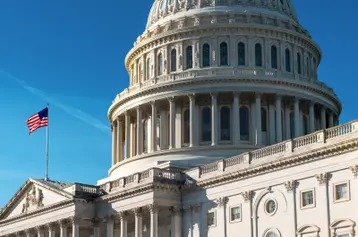Regulations, Tariffs & Taxes: Key Policy Changes Impacting SMBs

Table of contents
- 1.Regulations
- 2.Tariffs
- 3.Tax Reform
- 4.Department of Government Efficiency (DOGE)
- 5.IRS and ERTC
- 6.NLRB
- 7.Equal Employment Opportunity Commission (EEOC)
- 8.Nonprofits
- 9.Healthcare Transparency
- 10.What’s Next
With a new administration and Congress in place, several key developments are unfolding that small and medium-size businesses (SMBs) should watch closely. We’ll cover what’s happened, what’s next and why SMBs should be paying attention.
The Trump Administration has launched a wave of policy actions, through executive orders and agency directives, that are having a major impact on businesses, small and large, the stock market, supply chains, NGOs, nonprofits and individuals. With Republicans now controlling the White House and both chambers of Congress, this unified government has a unique window of opportunity to advance a host of legislative and regulatory priorities within the first 100 days. Let’s take a closer look into some of those priorities.
Regulations
One of the most significant shifts has been the effort to roll back federal regulations. President Trump signed an executive order requiring that for every new regulation proposed, ten must be eliminated. The goal? To reduce what’s seen as unnecessary red tape for businesses.
The Department of Labor, and other agencies have begun reevaluating rules affecting everything from overtime pay, which raises the salary threshold for overtime eligibility, to rolling back Small Business Administration rules to streamline access capital. This change could significantly impact SMBs.
Tariffs
On April 2, the Administration announced a “reciprocal” tariff plan, establishing a 10% baseline tax on imports from all countries, with higher rates targeting nations with trade surpluses with the U.S. This significant escalation in protectionist trade policy has introduced uncertainty for American investors and businesses.
A 90-day pause was announced on April 9 for most countries, excluding China (except for smartphones and electronics), to allow time for negotiations. While country-specific trade deals are anticipated, the 10% base tariff is expected to remain in place after the pause.
Higher tariffs are likely to raise costs for American consumers and SMBs. However, the Administration argues that successful negotiations could reduce tariffs on U.S. exports and foreign imports, enhancing supply chains and global demand for U.S. goods. In the meantime, companies should assess their exposure and consider long-term supply chain restructuring to manage risks and find new opportunities.
Tax Reform
Congress and the Administration are advancing legislation to extend the 2017 Tax Cuts and Jobs Act, aiming to provide long-term tax certainty as part of a pro-growth agenda. President Trump has recently signaled openness to raising income taxes on high earners to fund priorities like exempting tipped income and overtime pay, which could ease compliance and payroll costs for SMBs in service industries. However, this proposal faces resistance from GOP leadership.
The House recently passed a budget framework supporting $4 trillion in tax cuts. While debates continue over-spending cuts and targeted increases, the Administration aims to finalize a package before the August recess.
For SMBs, key benefits could include:
- Enhanced tax incentives for research and development.
- Reauthorization of the Section 199A Deduction, which reduces taxable income for pass-through entities.
- Extension of bonus depreciation, enabling immediate deduction of equipment costs.
- Maintenance of lower tax brackets, benefiting small business owners
Department of Government Efficiency (DOGE)
Created by executive order on day one of the Administration, the Department of Government Efficiency (DOGE) is working to reduce federal spending categorized as “waste, fraud, and abuse.” The agency is focused on downsizing and driving efficiencies through technology.
IRS and ERTC
On February 19, the IRS announced the termination of 6,700 probationary employees, including 3,500 from the Small Business/Self-Employed division. These actions, challenged in court, may delay small business tax processing. A federal hiring freeze compounds the issue, limiting the IRS’s ability to manage challenges like the ERTC backlog.
TriNet has been actively advocating for policy to expedite processing of customers ERTCs and to modernize IRS processing. Thanks to TriNet’s efforts, Congress sent a letter to the IRS directing them to expedite ERTC claims for our customers, helping many SMBS receive their funds.
Additionally, TriNet successfully lobbied for the modernization of key tax forms to an electronic system to enhance the processing speed and access to funds.
NLRB
The National Labor Relations Board (NLRB), which operates independently, has undergone leadership changes. President Trump dismissed General Counsel Jennifer Abruzzo and Democratic member Gwynne Wilcox earlier this year. Acting General Counsel William Cowen has since rescinded 31 of Abruzzo’s enforcement memos, including those concerning non-compete clauses and expanded definitions of protected activity.
While only two of five Board seats are filled, regional offices continue processing unfair labor practice charges. Once a permanent General Counsel is in place, we may see a narrower interpretation of employee status, confirmation of gig workers as independent contractors, and broader employer authority.
Equal Employment Opportunity Commission (EEOC)
The Trump Administration’s executive order on “Ending Illegal Discrimination and Restoring Merit-Based Opportunity” directs federal agencies to enforce civil rights laws against private-sector diversity, equity and inclusion (DEI) policies that involve employment decisions based on protected characteristics like race or sex. President Trump has dismissed two Democratic EEOC commissioners, one of whom is seeking reinstatement. With no quorum, the EEOC is currently unable to make significant policy decisions or enforce civil rights protections.
That said, acting Chair Andrea Lucas has since taken steps to limit DEI initiatives and reduce protections for transgender workers in line with the Administration’s stance on gender ideology. Bottom line for SMBs? You may see further efforts at EEOC to limit DEI practices, even seeking to redefine definitions of discrimination. SMBs can still promote diversity but should review DEI programs to ensure they comply with Title VII and are inclusive, non-discriminatory, and open to all employees.
Nonprofits
Many nonprofits are experiencing paused or canceled federal grants, creating financial strain. The Urban Institute estimates 60 to 80% of government-funded nonprofits may struggle to cover expenses if this continues. Organizations providing housing assistance, education, healthcare, and environmental services are among the hardest hit, especially in states like Alaska, Louisiana, West Virginia, Delaware, and Mississippi. There are also ongoing discussions about revoking the tax-exempt status of some 501(c)(3)s. Nonprofits should stay informed and be proactive to navigate and adapt to changes that may impact them.
Healthcare Transparency
On February 25, the President signed an executive order on healthcare price transparency. It strengthens enforcement of existing rules and requires hospitals and insurers to disclose actual—not estimated—prices. The Departments of Treasury, Labor, and HHS have been directed to implement and enforce these new regulations quickly. The goal is to enable patients to compare prices and shop for care more effectively.
What’s Next
The early actions of the Trump Administration and Republican-controlled Congress are ushering in sweeping changes that could significantly impact SMBs. From aggressive regulatory rollbacks and evolving trade policies to ambitious tax reform and government restructuring, SMBs face both new challenges and emerging opportunities. As these policies continue to unfold, business leaders should proactively assess their operations, compliance strategies, and financial planning to navigate the evolving landscape and position themselves for long-term success. Visit TriNet Advocacy for more and connect with our HR experts to stay ahead of the curve.
© 2025 TriNet Group, Inc. All rights reserved. This communication is for informational purposes only, is not legal, tax, medical, or accounting advice, and is not an offer to sell, buy or procure insurance. TriNet is the single-employer sponsor of all its benefit plans, which does not include voluntary benefits that are not ERISA-covered group health insurance plans and enrollment is voluntary. Official plan documents always control and TriNet reserves the right to amend the benefit plans or change the offerings and deadlines.
This post may contain hyperlinks to websites operated by parties other than TriNet. Such hyperlinks are provided for reference only. TriNet does not control such web sites and is not responsible for their content. Inclusion of such hyperlinks on TriNet.com does not necessarily imply any endorsement of the material on such websites or association with their operators.

Ralph Tyler
Table of contents
- 1.Regulations
- 2.Tariffs
- 3.Tax Reform
- 4.Department of Government Efficiency (DOGE)
- 5.IRS and ERTC
- 6.NLRB
- 7.Equal Employment Opportunity Commission (EEOC)
- 8.Nonprofits
- 9.Healthcare Transparency
- 10.What’s Next





